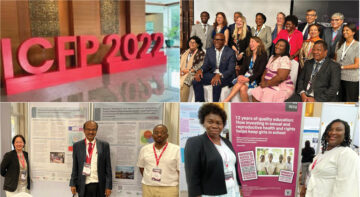Blogs

In 1978, Kenya’s total fertility rate was about 8.3, the highest in the world. By the early 80’s Kenya became one of the very few countries alongside Botswana and Zimbabwe to implement a national Family Planning (FP) programme. Since then the country’s fertility narrative tells of a history marked with fertility declines, stagnation and lately a revitalized slowing of number of children a woman has as a result of renewed efforts to increase use of contraceptives.
On Thursday 21st February 2013, AFIDEP sponsored a Science Café at Cedars Restaurant in Nairobi, Kenya, to discuss family planning in Kenya. AFIDEP sought to facilitate improved understanding of family planning issues among journalists and to promote accurate mass media representation of family planning issues in Kenya.
Reproductive health experts at the Café included Dr Isaak Bashir, Head – Division of Reproductive Health “ Kenyan Ministry of Public Health Services, Patricia Lasoi, Assistant Director of Population, Public Education & Media “ National Council for Population and Development (NCPD) and Dr Eliya Zulu, Executive Director of AFIDEP.
As fertility begun to slowly drop in Kenya during the late 90s, a renewed focus on the HIV epidemic meant that a lot of domestic and donor-funding was redirected away from family planning commodities.
The initial progress made by family planning efforts begun to regress and with that, contraceptive use stalled and fertility begun to rise once more.
This stimulated a push for increased national prioritisation for family planning in the mid-2000s led by government bodies such as the Division of Reproductive health, National Council of Planning and Development, and partners who lobbied for funding to support family planning commodities supply.
Patricia Lasoi from NCPD informed the Café’s participants that “more needs to be done given that NCPD currently has only 6 million Kenya Shillings for commodity security; the requirement is 26 million which includes commodity security, community mobilisation, consumables and equipment at health facilities and staffing amongst others.”
Although relative progress has been made with the average fertility falling to about 4.4 children, approximately one million babies are born in Kenya each year. Kenya’s current population, approximately 41 million people, is expected to more than double to 97 million by 2050.
A raison d’être being the high unmet need for family planning; one of four married women who would like to postpone or stop childbearing “ but are not using modern family planning methods for various reasons – traditional family planning methods have been shown to provide low ‘protectivity’.
Of concern, is that a large majority of the Kenyan youth, making up about 65 percent of the Kenyan population, are not accessing or using contraceptives. Some reasons for family planning inaccessibility mentioned at the Café included; stigma from health workers especially those who shun away contraceptives-seeking-youth, inadequate youth-friendly contraceptive information and services and parental and societal unwillingness to engage the youth in sexual discourse.
It therefore comes as no surprise that 18 percent of pregnancies occur among girls 15-19 years old in Kenya. Unfortunately, many of these pregnancies contribute to maternal mortality as a result of, complications arising during pregnancies or at birth or from procuring of unsafe and consequently fatal abortions. The highest cause of maternal deaths among girls 15-19 years is unsafe abortion.
Family planning, whilst politically and socially controversial, offer proven low cost intervention to development in health and in addressing all the eight Millennium Development Goals (MDGs). Crucially, it can save 99 percent of all maternal mortality and offers, delayed child bearing in the youth, prolonged birth intervals that contributes to increased child survival as well as increased participation in the labour market that comes with families having less young dependants, a major contribution to an improved quality of life for the families and by extension the national economy.
The Café’s experts concurred that, given that Kenya was one of the earliest pioneers to embrace family planning, the diluted commitment towards family planning and resulting lag in progress meant that Kenya is far behind where it should be. Kenya’s contraceptive prevalence rate (CPR) in 2010 was leveled at 46 percent.
“If Kenya’s commitment and momentum was maintained through the decades, it is likely that Kenya’s CPR would have been at par with some of the well to do countries like Singapore, with a current CPR of 62 percent,” Dr. Zulu told the Café participants. Meanwhile, in just the last decade, Rwanda has emerged a leader in regards to increasing contraceptive use due to its exemplary visionary leadership offering strong political support for family planning.
Following the 1994 genocide, Rwanda’s new political atmosphere resulted in phenomenon improvement in the use of contraceptives within its population. In the period of 2005-2010 Rwanda’s CPR went from being at a low of 13 percent to 52 percent.
Globally there has been a renewed call for national prioritisation for family planning, with major world funders like the Gates Foundation and DFID pledging support to meet the unmet need of 120 million women globally.
Kenya is set to benefit from this but the country needs to show some headway. The Kenyan government recently injected 2 million Kenyan Shillings in the commodity budget as a start of its commitment, thus bringing the total contribution from 6 to 8 million.
The youth stand as key beneficiaries of contraceptive information and services that are now being offered, more and more, in and outside schools; at youth facility centres; and on social media.
Nationally, family planning is supported in Kenya’s new constitution and vision 2030. The new constitution that ushers a shift from central to county governments could be a blessing or a curse for family planning. History could very well repeat itself if family planning ranks low on the agenda of county governments.
Nevertheless, Dr Bashir was optimistic indicating that at the national level, preparations were being made to make sure that enough family planning commodity stock was available for circulation across the country. For Bashir, emphasis was on changing the social norm amongst the public.
“If one looks at Zimbabwe for example, despite its political situation, its contraceptive use has steadily risen and fertility has declined, people demand for services they are entitled to. Our public need to change their attitude towards family planning and become empowered enough to know that they can demand for information and family planning services.” Patricia Lasoi further offered that NCPD is actually at the level of developing county programmes that will ensure family planning commodities are available and awareness is created within each county.
As the Café came to an end, Dr Zulu emphasized the role of the media in providing appropriately packaged information. In addition, with Kenya nearing its 5th General Election and some politicians quipping that an increase in fertility equals more votes, Dr Zulu cautioned, “Politicians focus should be on having an empowered, well-educated and healthy populace – a vital combination for development. If young adults begin having children early and have many children than they can feed, evidence shows that this negatively impacts on the survival of mother and child as well as living standards and quality-of-life of households that collectively impacts on Kenya’s development.”
Related Posts





